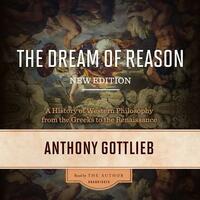You need to sign in or sign up before continuing.
Take a photo of a barcode or cover
26 reviews for:
The Dream of Reason, New Edition: A History of Western Philosophy from the Greeks to the Renaissance
26 reviews for:
The Dream of Reason, New Edition: A History of Western Philosophy from the Greeks to the Renaissance
challenging
informative
reflective
slow-paced
It is a beautiful journey. Plus some amusing comments from the author
challenging
informative
reflective
slow-paced
informative
reflective
slow-paced
Just couldn’t finish the last 2 chapters bc i felt a severe philo overload :’) but most of the book was a breeze!!! the author is amazing for making this subject matter so easily accessible and riveting (it's almost like a coherent narrative that actually FLOWS, unlike what you’ll expect for a book that spans the history of philosophy for three millenniums) while not compromising on the depth and expansiveness of knowledge it covers. Would def want to continue with the second part of this series if I manage to get/borrow them :-)
informative
reflective
slow-paced
challenging
informative
medium-paced
As a presentation of philosophical ideas in a popular format with common language this work is quite excellent, however, some of the the ideas are presented as if the complete repertoire of the philosophers were available, rather than mere fragments and fragmentary commentary from later authors. One technique this author used that was indeed impressive for a introductory work on philosophy was the intermix of later commentaries and advancements with the written thoughts of the philosopher at hand. I was disgruntled with the description of Parmenides' ideas as clearly absurd in the chapter on his ideas, yet later, at least in part, his influence on posterity seemed to justify the significance of his work.
The author did well in presenting Socrates, who did not write at all, by extracting a reasonable interpretation of Plato's early work, before his ideas developed beyond his teacher's. On the other hand, Aristotle's work was commented on for over two thousand years, particularly by the Catholic church and later during the reformation, and what can be known of his actual thoughts is presented in a reasonable way.
In the final section on the entire period from the ancients to the Renaissance, there is very little to say and almost nothing new. There may have been philosophy during that period in other parts of the world, like Arabia, China or India, yet this book is focused on Western Philosophy, even though other geographic areas may have been influenced by Western thought.
(In the movie "The Fifth Element", a reference is made to the Manicheans, who preserve the fifth element in order to the save of the world in the battle between good and evil. It turns out that there was a a school of thought, originating with a Persian named Mani who lived in the middle of the third century AD and that movement was Manicheanism, which had a central doctrine that good and evil are two mighty forces engaged in a more or less evenly matched struggle. Anyway, the group seems to have a fetish for the number 5 and use it in a lot of ways. I'm just noting the connection, nothing important here.)
Overall, I enjoyed this overview of the history of Western Philosophy. It is a good starting point for deeper research and a good introduction to a historical perspective on thought.
The author did well in presenting Socrates, who did not write at all, by extracting a reasonable interpretation of Plato's early work, before his ideas developed beyond his teacher's. On the other hand, Aristotle's work was commented on for over two thousand years, particularly by the Catholic church and later during the reformation, and what can be known of his actual thoughts is presented in a reasonable way.
In the final section on the entire period from the ancients to the Renaissance, there is very little to say and almost nothing new. There may have been philosophy during that period in other parts of the world, like Arabia, China or India, yet this book is focused on Western Philosophy, even though other geographic areas may have been influenced by Western thought.
(In the movie "The Fifth Element", a reference is made to the Manicheans, who preserve the fifth element in order to the save of the world in the battle between good and evil. It turns out that there was a a school of thought, originating with a Persian named Mani who lived in the middle of the third century AD and that movement was Manicheanism, which had a central doctrine that good and evil are two mighty forces engaged in a more or less evenly matched struggle. Anyway, the group seems to have a fetish for the number 5 and use it in a lot of ways. I'm just noting the connection, nothing important here.)
Overall, I enjoyed this overview of the history of Western Philosophy. It is a good starting point for deeper research and a good introduction to a historical perspective on thought.
informative
medium-paced
Omph! This may not be the best book to experience in audio form during trips back and forth to work. I'm a huge fan of philosophy but the topic can be dense on it's own and nearly unpalatable when read to you and a constant, drudging pace. I may have enjoyed it more if I had read it in physical form at my own pace. Don't let this shy you away from the book because Gottlieb's insights are helpful at presenting the ideas of classic thinkers under the context of their own time and ours. Also be aware that, as the title suggests, this is only Western philosophy and only up until the time of Descartes.

